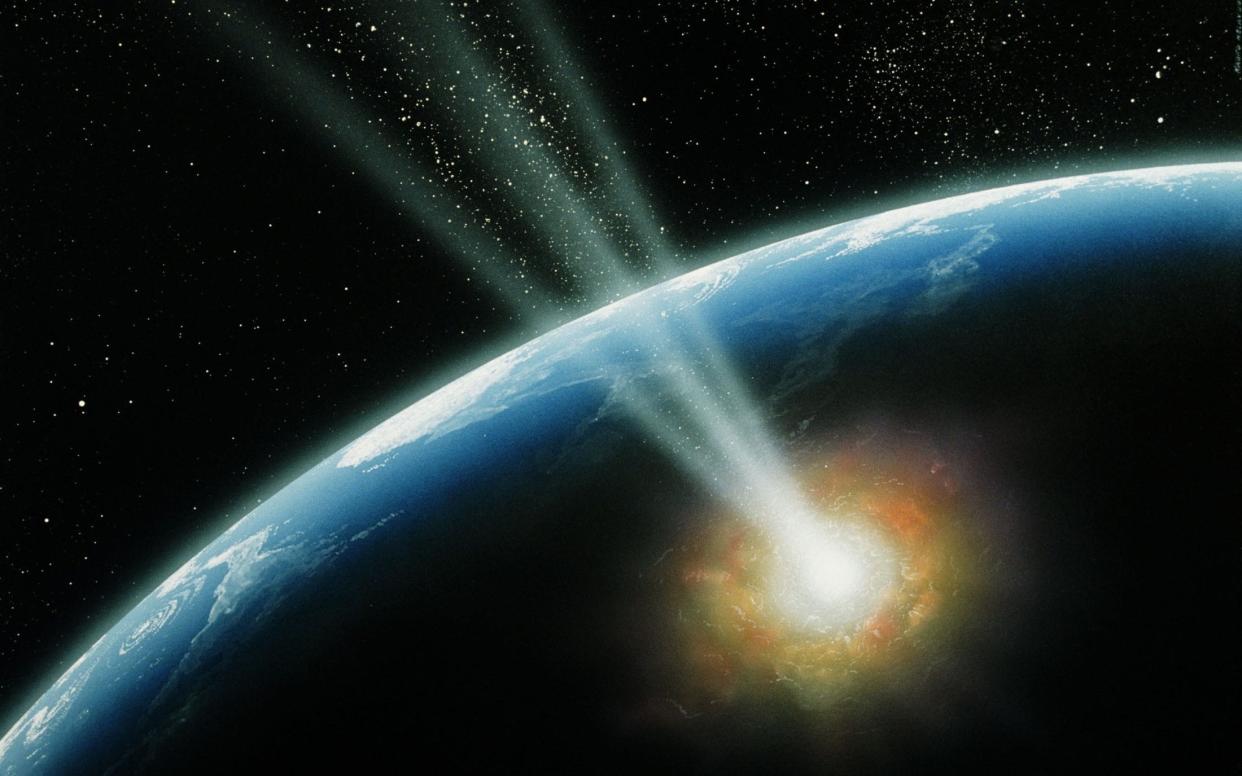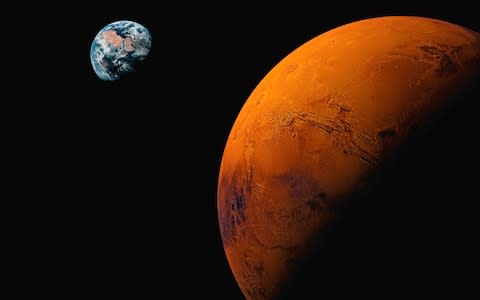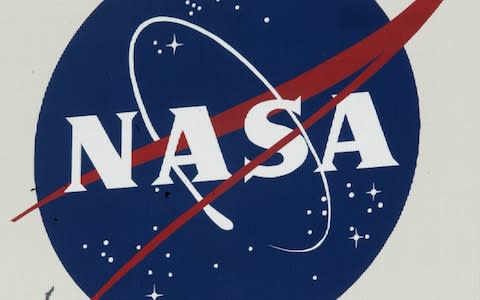Nibiru: How the nonsense Planet X Armageddon and Nasa fake news theories spread globally

Nibiru conspiracy theories about the end of the world have been circulating online for more than two decades, with the latest dubious prophecy predicting the apocalypse - September 23, 2017.
Planet X, or Nibiru, refers to a mythological planet in our solar system that will supposedly crash into Earth and wipe out the human race, however it has been consistently dismissed by Nasa and other experts as an internet hoax.
Despite absolutely no scientific evidence to back up the suggestions of a rogue planet getting rapidly closer to Earth, myths about Planet X continue to be perpetuated online.
End of the world (23 Sept 2017)
Of course, this isn't the first time time harbingers of doom have predicted the end of time; Nasa also had to deny the existence of Nibiru in 2012.
Throughout history there have been similar claims, but thankfully none of them so far have been proved correct.
How did conspiracy theories about Planet X start?
Online chatter about Nibiru began back in 1995 when Wisconsin native Nancy Lieder created the alien-conspiracy website ZetaTalk.
Ms Lieder claims to be a conduit for aliens from the Zeta Reticuli star system, 39.17 light years from Earth, who have warned her about the Nibiru catastrophe.
The conspiracy theory hasn’t gone away, with so-called Christian numerologist David Meade claiming Planet X is heading in our direction.
Meade believes October could see the start The Rapture and a seven-year tribulation period of widescale natural disasters.
Why September 23?
It has been claimed an unusual celestial arrangement mirroring signs from the Bible’s Book of Revelation, September 23, will signal the start of the end of the world.
However, the EarthSky blog notes there will be “nothing unique” about the sun, moon and planets on the date.
“In the past 1,000 years, this same event has happened at least four times already, in 1827, 1483, 1293, and 1056,” explains astronomer Christopher M. Graney.
Haven’t we been here before?

This isn't the first time the apocalypse has been predicted:
1844
American Baptist teacher William Miller first shared publicly his belief in the coming Second Advent of Jesus Christ in 1833, predicting he would return in the year 1843.
The Millerites were his followers and Millerism became a national movement, however when Jesus didn’t arrive, October 22, 1844, became known as the Great Disappointment.
1997
Twenty years ago, 29 members of Heaven’s Gate, a UFO religious millenarian group, committed suicide with the aim of boarding a UFO they believed was hiding behind the Hale-Bopp comet before the supposed end of the world.
2003
Planet X was also supposedly discovered by the ancient Sumerian people and was meant to hit Earth in 2003, but never arrived.
“This catastrophe was initially predicted for May 2003, but when nothing happened the doomsday date was moved forward to December 2012 and linked to the end of one of the cycles in the ancient Mayan calendar at the winter solstice in 2012,” say Nasa.
2011
The end of the world was also supposed to arrive on 21 May 2011, with Christian doomsday prophet Harold Camping predicting the Rapture would begin at 18:00 in each of the world's time zones, wiping out nay-sayers with rolling earthquakes as believers ascended to heaven.
2012
Nasa had to debunk an ancient Maya prophecy theory about the world ending back in 2012.
The Mayan connection “was a misconception from the very beginning,” astrophysicist Dr. John Carlson said at the time.
“The Maya calendar did not end on Dec. 21, 2012, and there were no Maya prophecies foretelling the end of the world on that date."
2015
Chris McCann, leader and founder of the eBible fellowship, said the world would be engulfed and destroyed by a great fire on October 7.
McCann said he was "surprised" by the outcome and wrote a blog post entitled: "A response to being incorrect with the prediction that, in all likelihood, the world would end on October 7."
What does Nasa say this time?

Nasa has definitively dismissed wild theories about Nibiru as pseudoscience, issuing a number of statements denying its existence.
“Various people are ‘predicting’ that world will end on September 23 when another planet collides with Earth,” say Nasa.
“The planet in question, Nibiru, doesn't exist, so there will be no collision. The story of Nibiru has been around for years (as has the 'days of darkness' tale) and is periodically recycled into new apocalyptic fables.”
They add: “Nibiru and other stories about wayward planets are an internet hoax. There is no factual basis for these claims. If Nibiru or Planet X were real and headed for an encounter with the Earth … astronomers would have been tracking it for at least the past decade, and it would be visible by now to the naked eye. Obviously, it does not exist.
“Eris is real, but it is a dwarf planet similar to Pluto that will remain in the outer solar system; the closest it can come to Earth is about 4 billion miles.”
Nasa fake news and the days of darkness tale
A fake news story being widely shared online suggests Nasa has confirmed Earth will experience 15 days of complete darkness in November 2015.
Another fake news video claims that Nasa has found Nibiru and confirmed it is heading straight for us.
Debunking website Snopes explains the “days of darkness” tale is a “bit of fake news lifted from an older viral rumour”
They say that it “had already been around the online block several times before,” adding, “it has long since become an evergreen online hoax — a jape that is typically resurrected a few times a year by dubious websites that simply update the time span for the alleged ‘period of darkness’ and send it winging around the internet again.
What do other experts say?
Nick Pope, who used to investigate UFOs and other mysteries for the Ministry of Defence, says “Nibiru doesn't exist”.
He adds: “The world won't end on September 23. Shame on the people promoting this hoax in the name of evangelical Christianity.”
Mr Pope told The Telegraph: “I'm certain Nibiru doesn't exist because if there really was a rogue planet heading for Earth, due to hit on Saturday, it would be visible to the naked eye by now.
“Furthermore, astronomers would have been aware of its presence for years, both through direct observation and through gravitational effects on other planets in the solar system.”
Why are some people so keen to promote this conspiracy?
“The people promoting this prediction seem to be doing so because of religious belief, tenuously linking the recent eclipse with Biblical passages, including one from the Book of Revelations,” Pope says.
“I suspect the reasons include self-publicity and the desire to promote their particular brand of evangelical Christianity.”
Is there anything we should be worried about?
“All this isn't to say that there aren't some existential threats out there, but if people want to worry about something, they should probably worry about North Korean missiles, or about Iran acquiring nuclear weapons, not about Nibiru,” Pope adds.
“There have been countless previous predictions of the end of the world. Self-evidently all these predictions were false. September 23 will pass without incident, just as we safely negotiated all the previous dates that had been put forward as doomsday.”
A prepper's guide to everything you need to survive the apocalypse

